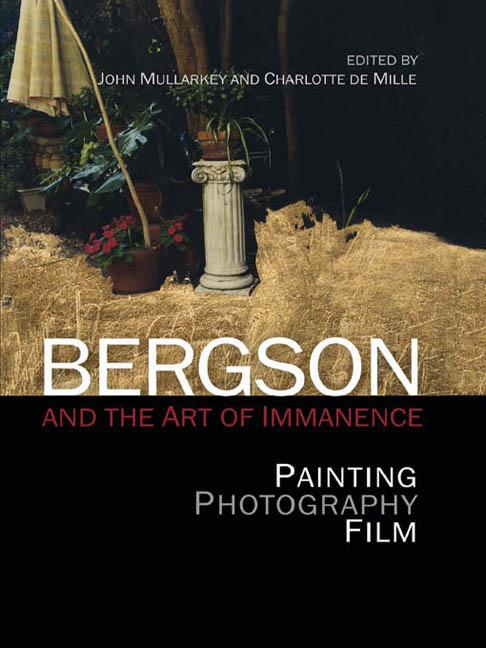Book contents
- Frontmatter
- Contents
- List of Illustrations
- Notes on Contributors
- Introduction: Art's Philosophy – Bergson and Immanence
- Part I Bergson, Art, History
- Part II Unconditional Practice
- Part III Immanence of the Visible
- 11 Painting the Invisible: Time, Matter and the Image in Bergson and Michel Henry
- 12 ‘For We Will Have Shown it Nothing’: Bergson as Non-Philosopher (of) Art
- 13 The Untimeliness of Bergson's Metaphysics: Reading Diffractively
- 14 Hyperaesthesia and the Virtual
- Afterword: An Art Historical Return to Bergson
- Index
12 - ‘For We Will Have Shown it Nothing’: Bergson as Non-Philosopher (of) Art
from Part III - Immanence of the Visible
Published online by Cambridge University Press: 07 December 2017
- Frontmatter
- Contents
- List of Illustrations
- Notes on Contributors
- Introduction: Art's Philosophy – Bergson and Immanence
- Part I Bergson, Art, History
- Part II Unconditional Practice
- Part III Immanence of the Visible
- 11 Painting the Invisible: Time, Matter and the Image in Bergson and Michel Henry
- 12 ‘For We Will Have Shown it Nothing’: Bergson as Non-Philosopher (of) Art
- 13 The Untimeliness of Bergson's Metaphysics: Reading Diffractively
- 14 Hyperaesthesia and the Virtual
- Afterword: An Art Historical Return to Bergson
- Index
Summary
The habitual labor of thought is easy and can be prolonged at will. Intuition is arduous and cannot last … and intuition, like all thought, finally becomes lodged in concepts such as duration, qualitative or heterogeneous multiplicity, unconsciousness – even differentiation.
Thus a multiplicity of different systems will arise, as many systems as there are external viewpoints on the reality one is examining, or as there are larger circles in which to enclose it. The simple concepts, therefore, not only have the disadvantage of dividing the concrete unity of the object into so many symbolical expressions; they also divide philosophy into distinct schools, each of which takes its seat, chooses its counters, and begins with the others a game that will never end.
Philosophy is an affair of movements and becomings, of lines and vectors, of reversals and displacements – it mostly uses transcendence, which comes (in a circular although broken manner) from experience toward the ground, from being toward Being, from Being toward the Affair of thought.
My problem is that of the re-orientation of thought.
Towards the end of Henri Bergson's 1911 lectures on ‘The Perception of Change’, a peculiar moment is reached when philosophy is forwarded as a kind of popular art, only one that is not for the masses so much as one that could be performed by everyone, generating altered perceptions ‘more continual and more accessible to the majority’. This general art allows a democracy of vision irrespective of artistic aptitude: ‘all things acquire depth – more than depth, something like a fourth dimension which permits anterior perceptions to remain bound up with present perceptions, and the immediate future itself to become partly outlined in the present’. In this chapter, I would like to continue certain themes from our introduction to this volume concerning the status of immanent art as a form of thought, this time with an additional reference to the work of Francois Laruelle.
- Type
- Chapter
- Information
- Bergson and the Art of ImmanencePainting, Photography, Film, Performance, pp. 206 - 231Publisher: Edinburgh University PressPrint publication year: 2013



